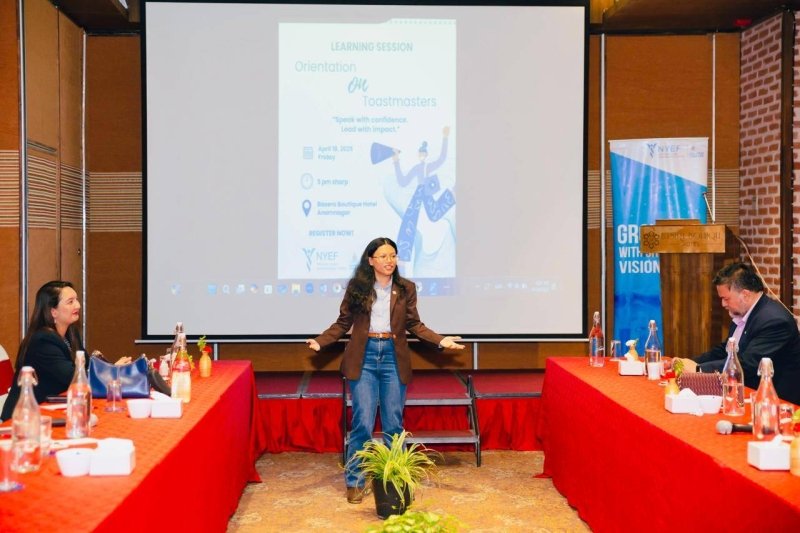
Three Things to Remember When Giving Feedback
Author: Alfa M. Shakya
Category: Travel
May 15, 2025
Everest, Nepal
There’s an adage Toastmasters members know by heart: feedback is the breakfast of champions.
There's an adage Toastmasters members know by heart: feedback is the breakfast of champions. As a public speaking and leadership platform with the word 'toast' in its name, food puns are but natural! Humor aside, feedback is the heart of Toastmasters which comes in the form of a separate session in each meeting called the 'Evaluation Session.' If you visit a Toastmasters meeting, you will see three distinct sessions: Table Topics, which is about practicing impromptu speaking; Featured Speech, where members deliver prepared speeches, and then Evaluation. Some like to call it a three-course meal with evaluation being the dessert; the best for the last.
Toastmasters: Building Communication Giants in Nepal's Corporate World
Arsenal's Arteta sees 'joy' in facing Champions League masters Real Madrid and Ancelotti
Evaluations at Toastmasters feature members who provide dedicated feedback, especially to those delivering prepared speeches. Apart from providing overall feedback to help the speaker improve, each speech has a given objective and evaluations revolve around it.
Giving and receiving feedback are both important elements of being a Toastmaster and are directly transferable to any field of life. Being a Toastmasters member since 2018, I've been in and around evaluation for quite some time. The first time my mind was spinning-am I really qualified to give feedback? Where do I start? What do I look at?
Thankfully over the years through my experience and guidance from fellow members, the answers have slowly revealed themselves.
Here are three things to consider when providing feedback.
Tapping into our awareness
I borrow many elements from my journey as a writer where feedback is just as crucial. When giving feedback to fellow writer friends feels overwhelming, we like to say, 'We may not be expert writers but we can be expert readers.' I bring this same ideology of feedback to other spaces too. I can be an audience, a listener, a reader. I'm not perfect, but I can tap into my awareness of what stood out for me and what might have been confusing. I can go a step further by trying to figure out why that particular something stood out or why something was confusing.
'It was amazing!' 'What an awesome presentation' - these might be our go to words after seeing a good work, report, or speech and we might mean well, but when used as feedback they carry the risk of not being very useful to the receiver. What does an amazing presentation actually mean? When swimming in the waters of subjectivity, specificity helps. Perhaps you liked their command over the language or their authentic storytelling style. Or maybe you found their conclusion weak or confusing because new elements kept coming up even at the end. Mentioning specific instances helps the person receiving feedback understand what is working and what is not. Being specific, however, is not an easy task. It requires keen observation, presence of mind, and the language to explain.
Finally, feedback is often an opinion and not an absolute statement, which is why using 'I' statements can be helpful. I observed this; I noticed that; I felt like this. 'I' statements make the receiver feel like the feedback is based on the person's own knowledge, experience, and filters instead of a sharp judgement that cannot be changed or altered.
On receiving the 'tough love'
Being at the receiving end of feedback can be tough at times. Who doesn't like to hear how amazing they are, and I'm sure we all are in our unique ways. But a little tough love is necessary to grow and learn, or else life might become stagnant. When receiving feedback, we must remember that it is not always necessary to take all that we have received. We must think through which kind of feedback is useful for us at this moment. Some feedback might be food for thought for the present time but something to work on in the future. This is also why it is a good idea to share what kind of feedback we are looking for-do we want to focus on our storytelling skills, our stage movements, or something else. This helps us receive feedback that we can immediately put to use.
Giving and receiving feedback can sometimes feel like a daunting task, but it can also be an enriching and fulfilling experience especially as we learn to cultivate openness and authenticity. Approaching feedback with a good heart and intention of support goes a long way. And the good news is that almost everything can be learnt.
The author is a writer, researcher, and podcaster; founder and host of How'd You Create That?-an art podcast about the creative process; 3x District Contest Winner at District 41, Toastmasters International; member at Everest Toastmasters.
Weather Update: Standard Himalayan mountain conditions
Peak Altitude: 8848 m
Risk Level: Medium
Expedition Info: First ascent expedition
Mountaineering
Himalayas
Nepal
Adventure Sports
Everest
First